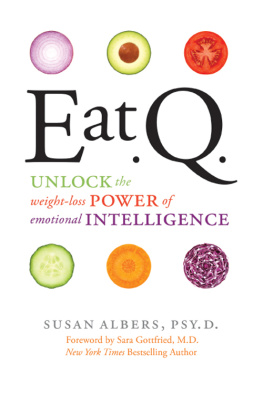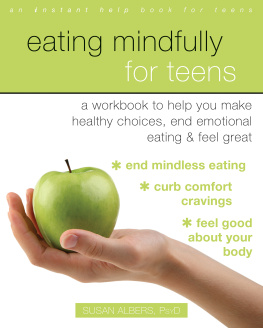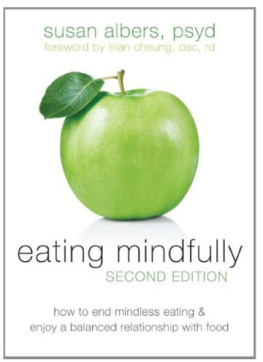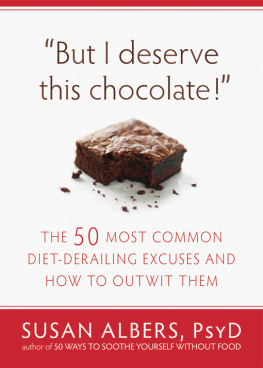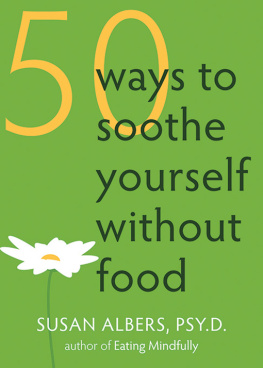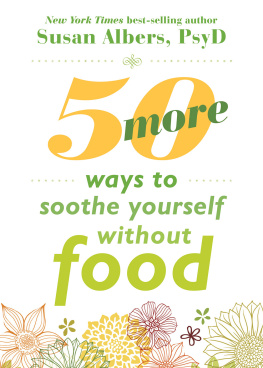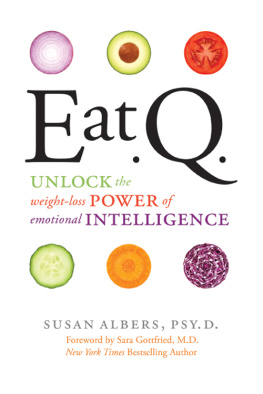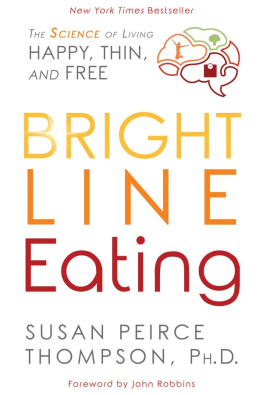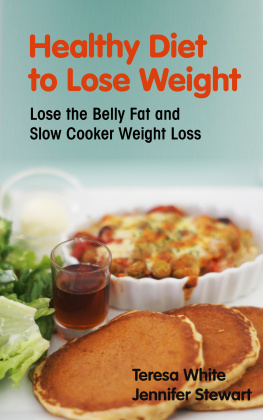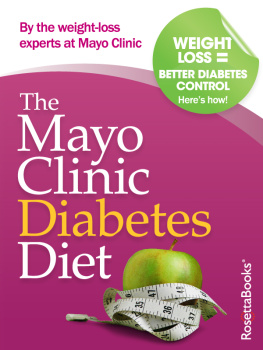This book is dedicated to all those who are on their journey toward healthy, smart, savvy eating
Want to know a secret? One of the best things you can do for your health is to eat glorious food, but not too much and not too little. You know, its that curious and enigmatic place between two worlds that few have mastered. Ive discovered in my past two decades of taking care of patients that most know what to eat, but they struggle with quantity, or they eat for reasons other than hunger, usually related to emotions and old dysfunctional patterns.
Not surprisingly, knowledge of what to eat doesnt get you very far when it comes to the sacred trip of fork to mouth.
I know about such things as a Harvard-educated integrative physician and author of the New York Times bestseller The Hormone Cure. Mostly, I know about the problems of food and weight by virtue of being human for the past four decades. In fact, I live those issues at least three times per day!
If you are similar to most people who struggle with food, whether you are overweight or not, you spend way too much of your day thinking about, romanticizing, and planning what youll eat. Perhaps you make radical vows on most Mondays to try the latest fad diet. Maybe your ears perk up when someone you know has the latest supplement that you hope might solve, once and for all, your trouble with food. (Sadly, that supplement doesnt exist. They simply make your urine more expensive.) Even more likely, you eat when stressed. Deadlines loom, your kid is sick, your parent needs you, and theres just no timeyou eat to soothe the stress hormones that are wreaking havoc in your system.
Introducing Dr. Susan Albers, Psy.D.
Thats where Dr. Susan Albers comes in. Susan is not just any psychologist: she specializes in mindful eating, mindfulness, emotional intelligence, weight loss, and, oh yes, the many struggles we experience around body image.
The short version: Susan is exceptional. She is the psychologist to read and be guided by. Give her permission to help you heal your rocky relationship to food. Susan wrote a powerful book, which you now hold in your hands, and it has the potential to upgrade your relationship to food and transform your life. Her new book, Eat.Q., is a fascinating and cant-put-it-down hybrid of emotional intelligence and mindfulness and how to apply it to the food on your fork.
Susan is not just the latest nutrition expert du jour. She is currently a practicing psychologist who works one-on-one with clients. Susan earned a doctorate in psychology, served her internship at the University of Notre Dame, and completed her postdoctoral work at Stanford University. She has been publishing her crucial work for a decade about how to eat mindfully, and she has improved the lives of thousands of people as she teaches them the practical tips that move the needle on food, particularly cognitive retraining and behavioral tweaks. That alone makes me want to be her client and her friend, and maybe invite her over for some kale and quinoa.
Lessons Learned from Eat.Q.
Eat.Q. has upgraded my own relationship to food and transformed my life. Honestly, Susan had me at the Venn diagram in chapter 1. She knits together the most important psychological concepts of our time and applies them to my fork. How incredible is that?
Emotional intelligence (EI) is all about how to be smarter about our connections with people. But now, Susan applies the tenets of EI to food, and thats a very good thing. In her own fun and pithy language, she points out that what works for leaders also works for eaters. Her checklists are powerful tools that illuminate everything you need to know about your eating style.
Part Road Map, Part Coach
Like most of us, youve probably heard Michael Pollans mantra: Eat food. Not too much. Mostly plants. While I love Michael Pollan, when he tells me not to eat too much, I suddenly feel rebellious and want to do the opposite. I channel Eve in the Garden of Edenbut instead of an apple, Im seeking my avalanche food. Hello, peanut butter? Dark chocolate? Malbec?
Susan provides the road map. And shes the best person for the job. She is besotted with untangling your problems with food and applying eating intelligence. Its devastatingly persuasive. Im going to go out on a limb and say its the smartest book Ive read on upgrading how you eat.
Who doesnt need that? In all my years taking care of women and men, Ive met only a handful of naturally mindful eaters. For instance, my friend Allison slices off the tiniest little piece of cheese when our families get together for dinner. Her slice of cheese is so thin, its sheer. She puts it on a gluten-free cracker and takes one tiny bite. Then she puts it down on a plate and chews mindfully, about thirty times before swallowing. She enjoys every bite without a hint of worry or the fear of overeating too many crackers. Thats a mindful eater. They are exceedingly rare.
The rest of us need this book.
Some folks whove mastered a topic are able to make it simple yet compelling. Susan has done that in Eat.Q. She offers her broad and deep understanding of why we overeat despite knowing better. More important, she offers alternatives. Not insane, yeah-right alternatives, but palatable ones. The type of remedies that a friend mentions over dinner, and you lean in, riveted by her wisdom.
Its Time
Eat.Q. is disarming in its simplicity. As I read Susans book, large chunks of available time to read it properly suddenly became availablebecause I was so intrigued by this new way of thinking. I realized she taps into the most urgent barriers that I have to eating glorious food.
You want this. It rewires your brain for the better.
I used to think, back in my twenties, that I could make up for my caloric excesses with exercise, and then I confronted the truth in my thirties, that food is most of the equation. In fact, about 70 percent of your weight is related to the food on your fork, from its nutragenomic value (how it interacts with your genes) to how it is eaten (savored or wolfed down), to quantity.
Heres what I wish for you: peace around food. I want you to eat with intelligence. I want you to not just read this book, but put Susans wise counsel into action todaythis minute, this hour. Dont put it off, because your relationship with food just might be the most important relationship in your life. Its nearly impossible to be a loving spouse or parent or even to complete your mission if youve got a strained relationship to food.
This is her best book yet. Its smart. Its informed. Its time.
Keep reading.
Sara Gottfried, M.D.
SaraGottfriedMD.com
Berkeley, CA
Contents
One cannot think well, love well, sleep well,
if one has not dined well.
Virginia Woolf
S ome of the smartest people I know overeat. They are successful in business, responsible, and creative. They know what a healthy lifestyle looks like: more fruits and vegetables, fewer processed foods, regular exercise. Intellectually, they know they would benefit from eating healthier, yet they find they are unable to improve their diets. My clients have asked one particular question over and over: How can I know how to eat well and not be able to do it? They wonder why their decisions dont match the way they desire to eat. The answer to this question is complex, but it will be made clearer throughout this book. To give you a hint, more often than not its a feeling or an emotion that lies in the gap between your decision and your actions.
When did choosing what to eat become so hard?
For a very long time in human history deciding to eat was a luxury. Most people scrabbled and scraped for food, and ate when it was available rather than when they wanted to. Emotional eating is a relatively new phenomenon, rooted in the recent ability to choose from an array of cheap, plentiful, pleasurable foods.

